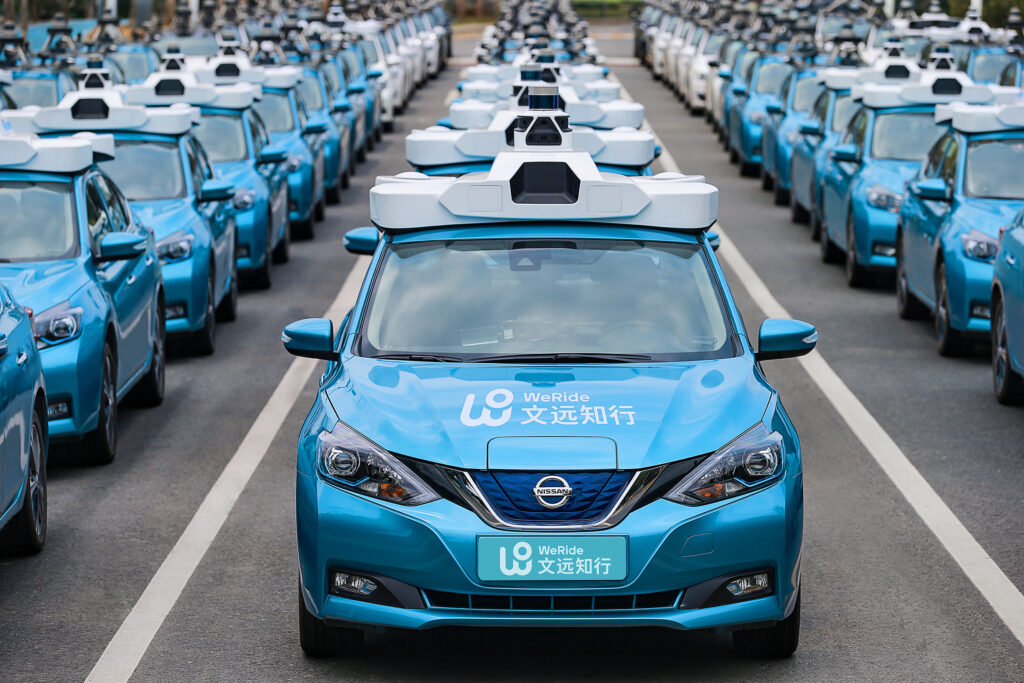The United Arab Emirates (UAE) has taken a significant step towards a future of autonomous transportation by granting WeRide, a Chinese autonomous driving company, the country’s first national license for self-driving vehicles. This groundbreaking permit allows WeRide to conduct extensive testing of its Level 4 autonomous vehicles, Robotaxi, on public roads throughout the UAE.

Robotaxis by WeRide Secures 1st Level 4 Autonomous License
The UAE has taken a significant leap forward in autonomous transportation by granting WeRide, a Chinese autonomous driving company, the country’s first national license for self-driving vehicles. This landmark permit enables WeRide to conduct comprehensive testing of Level 4 autonomous robotaxis on public roads. Level 4 autonomy means the vehicle can handle all driving aspects under specific conditions without human intervention. The license not only signifies a major achievement for WeRide but also supports Sheikh Mohammed bin Rashid Al Maktoum’s ambitious vision of achieving 25% fully autonomous transportation by 2030.
UAE’s Comprehensive National Policy for Electric Vehicles
In conjunction with WeRide’s license, the UAE’s Council of Ministers has introduced a comprehensive national policy for electric vehicles (EVs). This policy encompasses the development of a robust national charging network, regulation of the EV market, and the promotion of related industries, including autonomous vehicles (AVs). The objective is to reduce emissions, preserve road quality, and foster sustainable transportation solutions. The UAE is committed to embracing electric and autonomous technologies to create a greener and more efficient transportation system.
Dubai’s Role in Advancing Autonomous Mobility
Dubai, the UAE’s most populous city, has been at the forefront of various driverless vehicle trials. In 2019, the Dubai Roads and Transport Authority (RTA) organized the World Conference on Self-Driving Transport, a prominent event that gathered industry leaders to discuss advancements in autonomous mobility. The upcoming conference, scheduled for September, will feature a competition where companies and academic institutions will showcase their autonomous bus solutions. Dubai aims to leverage these technologies to limit the number of vehicles on its roads and scale up robotaxi operations to 4,000 vehicles by 2030.
Cruise Joins Dubai’s AV Ecosystem
Cruise, a San Francisco-based General Motors subsidiary, has been welcomed in Dubai to test and develop robotaxis. Cruise has been actively mapping Dubai since July 2022 in preparation for the launch of Cruise Origins, its purpose-built robotaxi, later this year. Several autonomous Chevy Bolts, utilized by Cruise for data collection and testing, have been spotted in Dubai’s Jumeirah 1 residential area. By partnering with industry leaders like Cruise, Dubai reinforces its commitment to becoming a global hub for autonomous mobility and innovation.
WeRide’s Ambitious Plans and Expansion in the Middle East
WeRide aims to test various self-driving vehicles in the UAE, including robotaxis, robobuses, robovans, and autonomous street sweepers. The company has already conducted successful robotaxi tests on select public roads in the UAE over the past year. Additionally, WeRide has solidified its presence in the China-UAE Industrial Capacity Cooperation Demonstration Zone, emphasizing the bilateral industrial cooperation between the two countries. Expanding its reach further, WeRide has set its sights on Saudi Arabia, announcing a collaboration to launch a robobus route in the country. This showcases WeRide’s commitment to transforming mobility across the Middle East.
Regulatory Landscape and Future Implications
While specific regulatory requirements for autonomous vehicles in the UAE are yet to be fully disclosed, the testing process will be overseen by the RegLab, an initiative led by the General Secretariat of the Cabinet. Unlike the UAE, the United States and China have adopted a more decentralized approach to AV regulation, with local governments taking the lead. California and Arizona, as major hubs for AV testing and commercialization, have distinct regulatory methods. California mandates companies to obtain permits from the Department of Motor Vehicles (DMV) and the California Public Utilities Commission. WeRide currently holds permits to test AVs with and without human drivers in California. In contrast, Arizona allows companies to self-certify their vehicles’ safety, requiring only the ability to bring themselves to a safe stop in case of system malfunction.
In summary, the UAE’s granting of a national license to WeRide for Level 4 autonomous robotaxis marks a significant achievement and aligns with the country’s ambitious vision for autonomous transportation. With a comprehensive national policy for electric vehicles and Dubai’s role as a testing ground for innovative autonomous solutions, the UAE is actively shaping the future of mobility. By embracing cutting-edge technologies and fostering partnerships, the UAE aims to create a sustainable and efficient transportation system for the benefit of its citizens and the environment.



